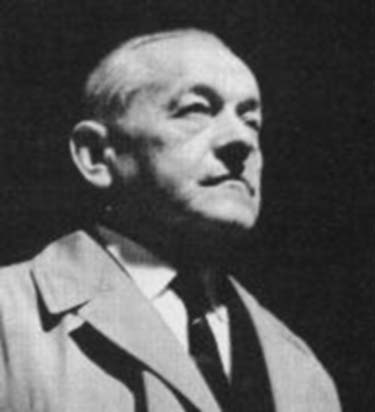![]()
Write us!
socialistviewpoint@pacbell.net
Europe
Book Review
Leopold Trepper and The Great Game
By Yazid Malek
 |
|
Leopold Trepper
|
Exposed to anti-Semitism in the Austro-Hungarian Empire, then in Poland, Leopold Trepper (1904-1982), like a great many Jewish workers, saw socialism as the solution to the problem of the oppression of the Jewish people in Eastern Europe. In The Great Game, published in 1975, Trepper tells the story of his participation in a particular episode of the Second World War—the history of the “Red Orchestra”—at the same time as he relates his journey as a militant to an exceptional destiny and role. This work, which is rich in analyses and illustrations about the actors and events of the historical period that it covers (from the end of the First World War to the death of Stalin), also bears witness to the struggle conducted by a whole generation of revolutionaries.
Trepper’s first commitment was made within a Jewish organization inspired by Marxism in Poland. Then, in 1924, he emigrated to Palestine, where he joined the Communist Party. Imprisoned and expelled by the British, he returned to France and was active in the MOI, (Main d’œuvre immigrée). Compromised by a shady episode of industrial espionage for the benefit of the Soviet Union, in 1932 Trepper left France for Moscow. There he organized the Marshlevski University, which trained Comintern professionals. What Trepper saw of life in Moscow revealed to him the economic and political reality of the “land of socialism” during the epoch of forced collectivization, of deportations and purges. For instance, Trepper describes how [Comintern] students were in fact [treated] better than ordinary people in the USSR; he recounts what was happening in the country. Thus one learns that Lenin’s “Last Will and Testament,” in which Lenin warned the party leadership against Stalin, was circulating secretly.
Trepper notes the various effects on the party’s functioning: the cult of personality, suppression of debate and free expression, caused by servility and “inner demoralization.” The revolution was degenerating. Prudence, even fear, forced each person to give up his revolutionary conscience. This is how Stalin’s dictatorship, as of 1930, was increasingly able to establish itself, strengthened by the complicity of foreign Communist Parties. From Trepper’s point of view, neither the fear of repression [i.e. arrest], nor having spent his entire life as an [CP] activist excused cowardly submission (including his own) to the Stalinist bureaucracy. Besides, certain activists knew how to resist the bureaucracy at the cost of their lives. About this he writes:
“But who then, at that time, protested? Who stood up to shout his disgust? The Trotskyists are able to claim this honor. Following the example of their leader, who paid for his stubbornness by [receiving] the blow of an axe, they fought Stalinism totally, and they were the only ones.
At the time of the great purges, they could no longer shout out their revolt except in the frozen vastness to which they were dragged to be more easily exterminated. Their conduct in the camps was dignified and even exemplary. But their voice was lost in the tundra. Today the Trotskyists have the right to accuse those who once howled with the wolves for [the Trotskyists’] death. May they not forget, however, that they possessed the immense advantage over us of having a coherent political system, which was likely to replace Stalinism, and to which they could cling in the profound distress of the revolution betrayed. They would not “confess,” because they knew their confessions would serve neither the party nor socialism.”
Trepper escaped from the purges that struck Polish Jews. In 1938, after Trepper’s first mission in France, General Berzin, who was in charge of the Red Army’s intelligence service, gave Trepper the job of creating a reserve network of spies in Western Europe, in anticipation of the conflict with Germany, which Berzin thought was inevitable. The Nazis later named this network the “Red Orchestra.” Trepper’s idea was to create commercial firms that would serve at the same time as covers and sources of finance for the network. During the war, one of these firms supplied the Todt organization, a part of the German war effort and an invaluable means of contacting the occupying power [in order to spy on them] and obtaining information and freedom of movement.
All the members of this network, whether communists or not, acted on the basis of their anti-Nazi convictions. The announcement of Operation Barbarossa (the plan to invade the USSR), which Stalin ignored, was to the credit of [Trepper’s] Red Orchestra, as were the plans for the German T6 Tiger tank, information about the production capacity of German industry, and many other important pieces of information.
Arrested in 1942, Trepper was the subject of a crude attempt at manipulation by the Nazis, who assured him that they wanted his collaboration in the plan for a separate peace with the USSR, which they named “The Great Game.” Trepper managed to alert Moscow and to reverse the direction of the manipulation before his escape in September 1943. In January 1945, on returning to Moscow, Trepper was imprisoned on Stalin’s orders, like so many other combatants. He was freed and rehabilitated after the dictator died.
Trepper then involved himself in the cultural development of the Jewish community of Poland; under [Polish Stalinist leader] Gomulka, the Polish Jewish community was again the target of an anti-Semitic campaign [in 1968]. [This campaign, which was universally condemned, led to the final dispersing of Polish Jewry.] Trepper then chose emigration to Israel, which he was allowed to do [only] after three years of difficulties.
Yazid Malek is a member of the French Communist Party and of the Communist Youth Movement. This is a translation of Leopold Trepper et le ‘Grand Jeu,’ which recently appeared in La Riposte.
—In Defense of Marxism, May 8, 2004
Write us
socialistviewpoint@pacbell.net
 "Remembering Reagan"
"Remembering Reagan"